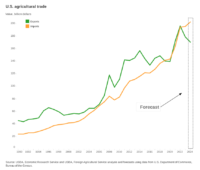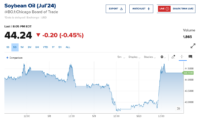Bloomberg's Clarice Couto reported this past Friday that "a surprising tax change in agriculture powerhouse Brazil has the potential to make soy grown in the world’s largest bean exporter less…
In “Historic Shift,” China’s Population Falls, as its Economic Growth “Near-Historic Low”
Eleanor Olcott and Sun Yu reported yesterday at The Financial Times Online that, “China’s population fell in 2022 for the first time in decades in a historic shift that is expected to have long-term consequences for the domestic and global economies.”
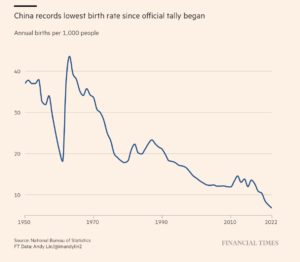
China is the the largest market for U.S. agricultural exports, which totaled $36.4 billion in fiscal year (FY) 2022.
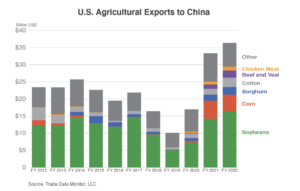
The FT article explained that, “On Tuesday, the National Bureau of Statistics announced that the total population fell by 850,000 in 2022 to 1.41175bn, the first decline in 60 years.
‘This is a truly historic turning point, an onset of a long-term and irreversible population decline,’ said Wang Feng, an expert on Chinese demographic change at the University of California, Irvine.
Yesterday’s FT article added that, “Fuxian Yi, a demographer at the University of Wisconsin-Madison, estimated that China’s population started to fall in 2018, but the drop was obscured by ‘faulty demographic data.’
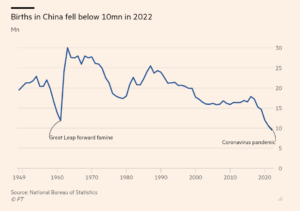
“‘China is facing a demographic crisis that far exceeds the imagination of Chinese authorities and the international community,’ Yi said, noting that the trend would act as a long-term drag on the country’s property market, a crucial engine of growth.”
What the first population decline in six decades means for the future of China via @BloombergTV
— Bloomberg TV (@BloombergTV) January 17, 2023
Follow our live blog for the latest: https://t.co/PQwBBVJ4ZA pic.twitter.com/IVNOKwYo0Z
Liyan Qi reported in today’s Wall Street Journal that, “The data revived the question of whether China has already lost the status of the most populous country to India, whose estimated 1.4 billion population is still growing.”
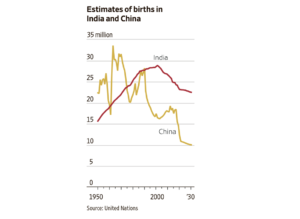
And Bloomberg News reported yesterday that, “‘The population [of China] will likely trend down from here in coming years,’ said Zhang Zhiwei, president and chief economist at Pinpoint Asset Management Ltd. ‘This is very important, with implications for potential growth and domestic demand.'”
“Due to the decline, the Chinese economy may struggle to overtake the US in size,” the Bloomberg article said.
Meanwhile, Financial Times writers Thomas Hale iand Sun Yu reported yesterday that, “China’s economy grew by just 3 per cent in 2022, underscoring the heavy costs of the government’s longstanding zero-Covid strategy before it was abruptly abandoned last month.
“The country’s gross domestic product figures missed Beijing’s official growth target, which at 5.5 per cent was already the lowest in decades. Other than in 2020 at the beginning of the pandemic, when full-year GDP expanded 2.2 per cent, growth was the weakest since 1976.”
China's economy grew 3% in 2022
— Bloomberg TV (@BloombergTV) January 17, 2023
This was the second slowest pace of growth since the 1970s, but added to optimism about a future recovery in the country https://t.co/WG4HgiNW38 pic.twitter.com/uZoRV3IHsr
David Pierson, Keith Bradsher and Muyi Xiao reported on the front page of today’s New York Times that, “After China’s abrupt reversal of ‘zero Covid’ restrictions, the nation’s vast machinery of virus surveillance and testing collapsed, even as infections and deaths surged. Now, the authorities face another problem: Angry pandemic-control workers demanding wages and jobs.”
The Times article pointed out that, “The unrest this month highlights a little-noticed aspect of the social and economic fallout from China’s ‘zero Covid’ policy U-turn. Mass testing was a cornerstone of China’s strategy of isolating the virus before it could spread. But Covid testing of any sort is no longer in high demand. Companies that manufactured test kits and analyzed results in a lab are seeing their revenues plummet, leading to layoffs and pay cuts for their workers.”
And Brian Spegele, Cao Li and Karen Hao reported on the front page of Friday’s Wall Street Journal that, “A month after scrapping most of its zero-Covid restrictions, China is experiencing all at once what many other nations have been navigating for three years.”
“It is a combustible mix and the outcome is particularly difficult to predict. No other country instituted zero-tolerance measures as widely for as long—and few shed controls as abruptly,” the Journal article said; adding that: “There are a wide range of possibilities for what comes next, from a relatively quick bout of infections followed by an economic rebound to a more serious public-health crisis, especially in poorer areas. How it plays out will have ramifications for Chinese leader Xi Jinping’s leadership for years to come.”
Elsewhere, Reuters writers Dominique Patton and Tom Polansek reported earlier this week that, “China approved imports of eight genetically modified (GM) crops, permitting shipments of GM alfalfa for the first time after a decade-long wait, the country’s agriculture ministry said on Friday.
“Global seed makers and the U.S. government welcomed the decision after Beijing’s slow approval process disrupted grain exports and launches of crops that need clearance from China because it is one of the world’s biggest agriculture markets.”






